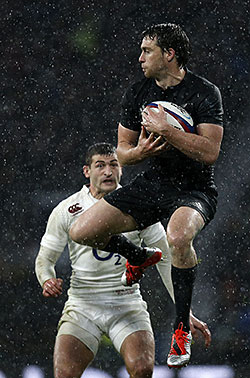New Zealand All Blacks: rugby’s all-time favourites

Roula Khalaf, Editor of the FT, selects her favourite stories in this weekly newsletter.
In the world of rugby, conventional geopolitics are turned upside down. Here, the US and Japan are loveable underdogs and the ruthless hegemonic superpower is New Zealand — in most other universes a small, geographically isolated Pacific nation.
But New Zealand is a country of greater interest and achievement than is often credited. It has a remarkable record of political innovation, including, in 1893, being the first country to give the vote to women. It provided one of the first two men to reach the summit of Mount Everest and has produced distinguished scientists, soldiers and writers out of a population of 4.47m.
Yet as its leading contemporary historian James Belich has written: “There are only two spheres in which New Zealand has been a world superpower. One is the export of protein. The other is sport.”
That sporting heritage extends beyond rugby union. New Zealand has been four times world netball champion. Its sailors, while sometimes flying other flags, dominate the America’s Cup. It has produced numerous world-class track and field performers, and was runner-up in the Cricket World Cup earlier this year.
All of this, however, is ultimately overshadowed by rugby union and the national team, the All Blacks — current World Cup holders and by some margin the world’s top-rated team. For better or worse, rugby is the main means by which New Zealand is recognised by the rest of the world.
It is not by coincidence that in debates over changing the national flag — the current version is all too readily mistaken for Australia’s — designs featuring either or both a silver fern and a black background (All Black insignia for more than a century) dominate.
The influence of the All Black brand is evident across New Zealand sport, as displayed by the national basketball team, the Tall Blacks. Its success is periodically celebrated in texts seeking to apply All Black lessons to business life.
The All Blacks are to rugby what Brazil are to football: the most famous and charismatic name, the team that can guarantee a sold-out stadium wherever it plays and whose rare defeats are a historic moment in the annals of the victors.
It is a standing that dates back to 1905, when New Zealand was still designated as a colony, and the first time the All Blacks visited Europe. The players ran amok across Britain, Ireland and France, losing only one match — a titanic contest with Wales — out of 33. Before returning home, the team’s captain and vice-captain, Dave Gallaher and Billy Stead, dictated at extraordinary speed a 300-page book on the game, The Complete Rugby Footballer on the New Zealand System. It is one of rugby’s seminal texts. Welsh historian Gareth Williams wrote: “Their penetrating discussion of the game — lines of running, angles of packing, miss moves, compiling statistics on different phases of play — brought a startlingly new technical dimension to rugby literature, raising it to a level of sophistication previously unheard of and rarely exceeded since.”
It was an early reflection of one of the eternal verities of sport: all countries play sports, but those that excel — like Austria and Hungary in football between the 1920s and 1950s, or Holland for much of the time since — also think about them.
The FT’s guide to the 2015 Rugby World Cup

The big men are back. The world’s best 620 players (minus the infirm and overlooked) have assembled across England and Wales to contest the eighth world championship. View our interactive guide.
Read more
New Zealand is permeated by rugby. It is a country where literary heavyweights such as Maurice Gee (The Big Season) and the Booker prize-shortlisted Lloyd Jones (The Book of Fame) have devoted novels to the game.
Many New Zealanders know their rugby history as well as some societies know their scripture. While interviewing surviving members of the 1953 All Blacks a decade ago, I found that every one had a chapter-and-verse knowledge of the defeat suffered by their predecessors in 1905. Wales is much the most rugby-conscious of the home nations, but only one of their players, the late Cliff Morgan, has been such a sage of the game.
It is a history worth knowing. The All Blacks’ winning record over more than 100 years is about 78 per cent. Next best is South Africa, at around 66 per cent, with England a little over 57. New Zealand’s away record — more than 71 per cent — is better than anyone but South Africa’s home record.
They have a winning record against every opponent, with only South Africa (35-52) managing to win even half as many matches as they have lost against the All Blacks. Their combined record against British and Irish teams including the Lions, is 141 wins to 17 defeats. Ireland and Scotland have not beaten them in 110 years of trying, nor Wales since 1953.
They have become still more dominant in recent years, with a win rate since 2000 of nearly 86 per cent and an edge of well over two to one against every rival. The All Blacks have been rated number one for 120 months out of the 142 that World Rugby’s rankings have existed.

Yet there is one significant asterisk against that record: World Cups. New Zealand have won twice and are the current holders. But their victories, in 1987 and 2011 — both came in tournaments they hosted. Only when they win away will their World Cup record remotely resemble their dominance elsewhere.
Huge quantities of ink — far from all of it of New Zealand origin — have been spent on this mystifyingly modest record. The first two World Cup defeats are easily explained. In 1991, Australia were genuinely a superior team, while the 1995 Springboks played as if they had the forces of history on their side.
It is the three since, in particular the defeats in 1999 and 2007 by distinctly vin ordinaire French vintages, that are the mystery. The All Blacks carry, courtesy of history, a unique burden of expectation. They are the only team for which anything but winning the trophy is automatically regarded as failure.
Spiro Zavos, one of the most astute chroniclers of New Zealand rugby, has argued that since they invariably play to a system and apply Aristotelian logic, they are occasionally vulnerable to the unexpected. The specific aversion to Cartesians may, the cricket coach John Bracewell has suggested, be rooted in being “unable to work out how the French seem to have a second gear. As New Zealanders you go full out from the start.”
Changing playing styles may have an impact on this. The All Blacks have played the most exciting rugby of the past 20 years, perhaps at the risk of offering opponents more chance of finding answers. Australian prop Stan Pilecki reckoned that “when you play in black, there’s not much doubt what your game plan will be” — a plan that All Black legend Colin Meads defined as “heads down, bottoms up and drive, drive for 80 minutes”.

Nevertheless, it is tough to make a case against them as favourites in 2015. They have carried on seamlessly from victory in 2011, with a winning record of more than 90 per cent from 47 matches and only three defeats — by England in 2012, South Africa in 2014 and Australia in 2015. Julian Savea’s 30 tries are comfortably the most in internationals during this period.
A potential weakness is that their two living legends — skipper Richie McCaw, who reportedly turned down a knighthood in 2011 and has played in 125 winning test teams (more than all but four other players have ever played) and all-time record points scorer Daniel Carter — may be on their last legs.
But both remain formidable performers, and an inspiration to talents in their prime such as number eight Kieran Read, ball-handling lock Brodie Retallick, incisive wing Ben Smith and stylish centre Conrad Smith.
Opponents will note that New Zealand are most vulnerable in the final stages of a tour. England’s win was in the autumn internationals of 2012, the All Blacks’ last match of the year, while Ireland were defeated only in the last few seconds at the same stage a year later.
But sceptics should also know that the All Blacks are the one team that can determine their own fate. If they play as they can at the sharp end of the tournament, that asterisk will be history.
Comments